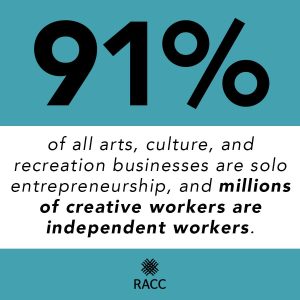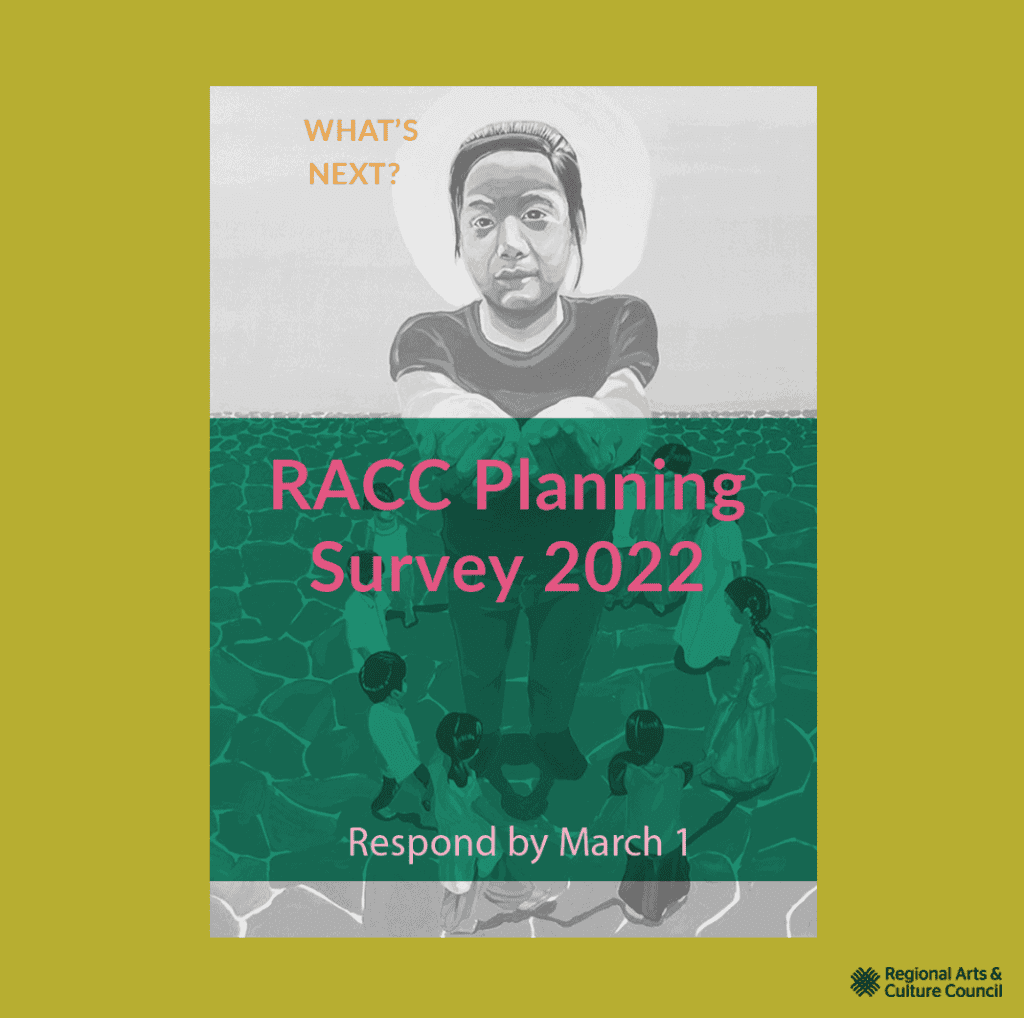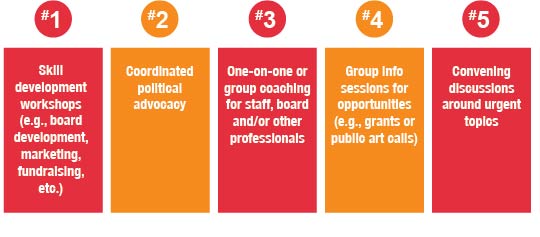 How It Works
How It Works
The Creative Economy Revitalization Act (CERA) would:
-
-
-
-
-
-
-
-
- Get creatives working by creating competitive workforce grants program within the Workforce Innovation and Opportunity Act;
- Administer grants to eligible government, nonprofit, and for-profit organizations, as well as state and local workforce boards through the Department of Labor, in coordination with the National Endowment for the Arts;
- Require that grantees create art that is accessible to the public such as free concert series, large-scale murals, photography exhibits, published stories, or dance performances.
To rebuild and reimagine the United States post-pandemic, we must put creative workers to work.
Looking to the future, and to recovery post-pandemic, CERA proposes to leverage our creative power, putting creative workers to work rebuilding, reimagining, unifying, and healing communities in Oregon and every state, every region, and within tribal lands.
“Millions of artists and creative workers have lost jobs during the past year. In Native communities, the loss of income and work has been dramatic with shuttered arts and cultural venues, cancelled festivals and gigs, and rescheduled fairs and events. The Creative Economy Revitalization Act will provide a lifeline to artists and the creative economy unlike anything seen since the WPA of 1933. Getting artists and creatives back to work creating public art is critical, and there is no greater power than the arts to unite, heal, and empower people and communities.”
–T. Lulani Arquette, President & CEO, Native Arts and Cultures Foundation
In 1935, facing 20% unemployment, President Roosevelt created the Works Progress Administration (WPA). In 1973, at a moment of similar crisis, President Nixon signed the Comprehensive Employment and Training Act (CETA). These federal policy efforts—one by a Democrat, one by a Republican—sparked national recovery at two crucial moments and can inspire action now.
Investment in the creative economy has proven essential in each previous workforce effort. Similar investment now can be a basis to foster unity, expand and improve infrastructure, address community health issues, and drive innovation, recovery, and reimagination. The next Administration must draw upon the creative energies of the country’s 5.1 million creative workers to energize our collective communities, reimagine how communities can thrive, and improve the lives of all.
Creative workers are a part of our local economy and everywhere across the United States. Like others who are unemployed and underemployed, creative workers have much to offer in healing, recovery, and beyond. Paying artists and other creative workers for their contributions to the health, equity, and well-being of our communities rebuilds our economy. These workers uniquely engage communities to contribute to well-being and connectivity, reflecting back local history, amplifying the unique character of places, and renewing the civic and social lives of community members through their work. To thrive tomorrow, we must create a jobs ecosystem for creative workers today.
“The National Alliance of Community and Economic Development Associations (NACEDA) is happy to support the Creative Economy Revitalization Act. We found most compelling that this Act would support creating local projects that tell community stories and bring forward community identity, particularly in the places, and among the people, most impacted by the pandemic.”
–Frank Woodruff, Executive Director, National Alliance of Community and Economic Development Associations
Creative workers, and the hundreds of thousands of creative businesses they drive, have been devastated by COVID-19, more than almost any other sector. One study pegs the creative worker unemployment rate at 63% and a collective income loss of more than $60 billion. Creative workers stand ready to heal, strengthen, rebuild, and reimagine our communities.
Arts and culture are crucial components of civic dialogue, and research shows that in the primary areas of concern for recovery—including racial justice, health, education, community cohesion, and public safety—the integration of creative workers improves outcomes and sets up the community for success. Through a suite of efforts coordinated via a centralized office housed in the West Wing, artists and creative workers can be put to work addressing pressing issues of the day.
Read more on 16 specific actions that the next Administration can take to activate the creative economy within a comprehensive national recovery strategy at www.creativeworkers.net
To see more detail on the proposed actions to take to address these policies, which together would put 300,000 creative workers back to work, click here. These actions were arrived at through focus groups with the signatories to the Put Creative Workers to Work proposal.
This proposal was collaboratively developed by more than 100 partner organizations and individuals, and has been endorsed by more than 2,300 creative businesses and creative workers.
“Americans for the Arts, in partnership with the nation’s 4,500 local arts agencies, 56 state arts agencies, 5.2 million creative workers, and the state arts alliances that advocate for them, endorses this bill to invest in the creative economy. Supporting creative workers makes strong business sense as the arts drive economic and community transformation in American cities and towns. The Arts are a national asset, and our country thrives because artists and creative workers are a part of the collective workforce helping our citizens recover and grow from the trauma of COVID-19 and racial inequity, restart stalled local economies, and reimagine our shared way forward.”
– Nolen V. Bivens, President and CEO, Americans for the Arts
The creative engine can power America’s economic recovery
Any investment in infrastructure, community, and workforce recovery must include the creative economy.
| Additional Relief for Creative Workers and Companies |
Restart Funds & Hiring/Retention Incentives |
Federal Investment in Residencies, Commissions |
| To address the devastating longer-term impact of the COVID-19 pandemic on the creative economy, and to preserve cultural infrastructure and capitalize on the economic and social rebuilding benefits of the arts, creative workers and creative businesses seek additional investment in relief efforts to support the sector. |
Both directly and by redistribution to local and state government, the creative sector seeks financial runways to allow cash-strapped creative businesses to restart and produce new sellable creative products and incentives for businesses and schools to accelerate rehiring and encourage retention of creative workers. |
Echoing previous federal works programs, the creative sector seeks artist and creative worker residencies within federal departments, direct commissioning of individual artists and cultural organizations, and the integration of creative workers into health, safety, education, and community development programs. |
| Improved Conditions for Independent Contractors |
Changes to Inequitable Federal Policies |
Stronger Representation within Government |
| 91% of all arts, culture, and recreation businesses are solo entrepreneurs and millions of creative workers are independent workers. This locks them out of unemployment benefits, affordable health insurance, and access to capital–which must change to ensure a sustainable living. |
At no additional cost to the government, the creative sector seeks adjustments to various existing federal policies that disallow or discriminate against creative workers and other independent workers. |
To coordinate the policy relevant to the creative economy, with a particular focus on recovery and relief, the creative sector recommends the installation of an Arts, Culture, and Creative Economy senior advisor to maximize the impact and recognition of creative enterprise. |
Adapted from the Put Creative Workers to Work platform, Oregon COVID-19 Impact Survey.
What Can You Do?
Advocates, use the E-alert on the CERA bill to quickly contact your members of Congress and request they join on to the legislation as a Co-Sponsor.
Click here to view an infographic to further explain this legislation.
Full bill text can be found here.
Read our previous posts about CERA:
Creative Work is Work
What is the Creative Economy Revitalization Act (CERA)? Why Do We Need It?
References
www.creativeworkers.net
https://www.wpaforthearts.com/get-involved
#regional411
#artsadvocacy
#ArtsHero
#WPAForTheArts
#PutCreativeWorkersToWork
#CreativeWorkers
#CreativeEconomyRevitalizationAct
#AFTA






